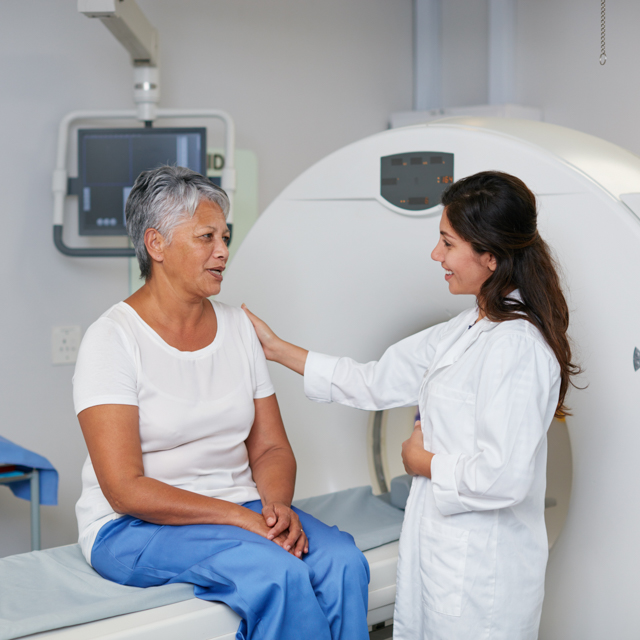Leaning on your care team — as well as on friends and family — can help ease your initial fears and worries.
Learning you have lung cancer can be a frightening experience. It’s normal to be afraid, have a lot of questions, and occasionally feel overwhelmed. While many things may feel out of your control, you can seek out ways to take an active role in your care decisions. Start by educating yourself about your diagnosis and ensuring you get the support you need.
“One of your first big steps may be getting over the initial fears and worries,” said Emily Skotte, a nurse practitioner at Vanderbilt-Ingram Cancer Center. “A cancer diagnosis can affect everyone differently, and sometimes in unexpected ways. The fears may come and go, popping up when you least expect them. Give yourself grace and patience, and find what works for you as you learn to manage these new emotional experiences.”
Managing fear
Skotte recommends researching your condition, as long as this does not increase your anxiety. This may help you feel more in control, and it will also help you communicate effectively with your health care team as you work with them to make decisions about your lung cancer treatment. Skotte recommends that patients ask their providers for additional support. The Vanderbilt-Ingram Cancer Center has a resource center that can provide information and assistance.
“Don’t go on your cancer journey alone,” Skotte said. “Rally trusted friends and family around you and let them know you need their support. They will want to help — don’t be afraid to tell them specifics about what you need the most.”
Specialized counseling or group therapy may help as well, she added. “Your health care team’s social worker can connect you with groups that teach coping practices for people with cancer, such as yoga, art, meditation and more,” she said. “You may also find supportive communities online.”
Meet your care team
Throughout your lung cancer treatment, you will work with a specialized team. Each member has a specific role to play, and the team will work together, with you included, to plan the best individualized care.
It can be helpful to familiarize yourself with everyone’s role from the start. Your specially trained physician team will likely include a:
- Thoracic surgeon, who performs procedures in and around the lungs.
- Medical oncologist, who uses chemotherapy, immunotherapy, medications and targeted therapies to treat cancer.
- Radiation oncologist, who treats cancer with radiation therapies.
- Pulmonologist, who treats lung conditions.
You may also work with nurse practitioners, nurses, physician assistants, social workers, rehabilitation specialists, dietitians and pharmacists.
“These professionals will combine forces to guide you through each step in the treatment process, while keeping you informed and as comfortable as possible,” Skotte said. “They will help you interpret test results, understand your treatment options and prepare for each phase of treatment. Lean on them and don’t be afraid to ask questions and state your preferences.”

For new diagnoses, or ongoing care
When you’re facing cancer, you want everything to be just right: the right team of experts around you, providing you with the right diagnosis and the right treatment, at the right time.
At the Vanderbilt-Ingram Cancer Center, our expert teams provide all that and more. We combine advanced research, technology and techniques with personalized, compassionate care. Our growing number of locations may mean that expert care is closer than you think.




